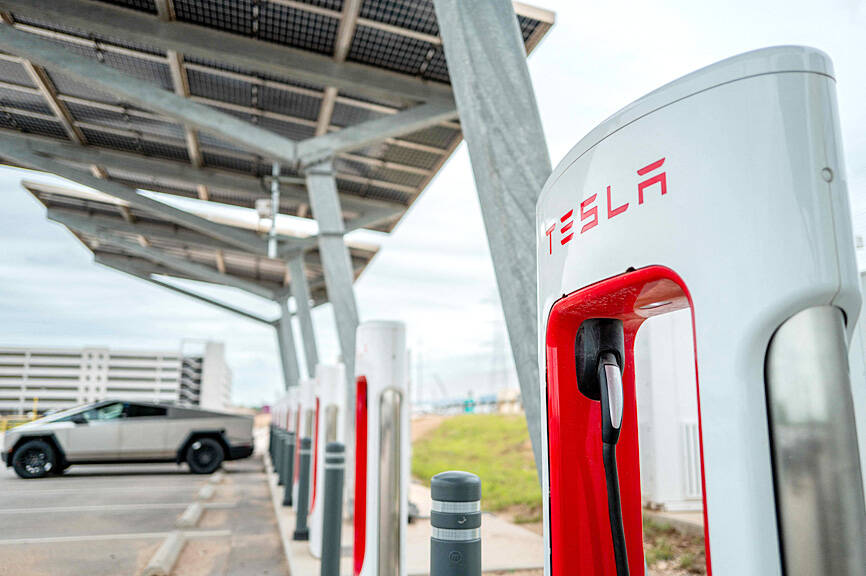Tesla Inc on Tuesday reported a big drop in quarterly profits amid an increasingly cutthroat electric vehicle (EV) market, but shares rallied as CEO Elon Musk pledged to accelerate plans for more affordable EVs.
Tesla reported profits of US$1.1 billion, down 55 percent year-on-year on revenue of US$23.3 billion, down 9 percent, as the company described EV sales as “under pressure.”
However, shares rocketed up more than 11 percent in after-hours trading after Tesla pledged to “accelerate” new more affordable vehicles — something Wall Street analysts have been clamoring for.

Photo: AFP
The results, which lagged analyst estimates, came after the company last week announced the layoffs of about 14,000 workers.
Cutting headcount by more than 10 percent would save Tesla more than US$1 billion annually in costs, chief financial officer Vaibhav Taneja said on a conference call with analysts.
In spite of the belt-tightening, Tesla’s report did provide some news likely to cheer investors, saying it planned to “accelerate the launch of new models ahead of our previously communicated start of production in the second half of 2025.”
The new vehicles would include “more affordable models,” Tesla said.
At the outset of Tuesday’s conference call, Musk said production of the vehicles would start early next year or late this year, up from the prior time frame of the latter half of next year.
The vehicles “will use new aspects of the next generation platform as well as aspects of our current platform,” Musk said. “So it’s not contingent on any new factory or massive new production line.”
Musk said more details would be released in August.
The Tesla CEO spoke at length about the promise of the company’s autonomous ventures, saying valuing the EV maker like a car company is the “wrong framework.”
“If somebody doesn’t believe Tesla is going to solve autonomy I think they should not be an investor,” he said.
The statement about new vehicles comes on the heels of speculation that Tesla is shelving plans for the “Model 2,” the unofficial name of what is expected to be a mass-marketed, lower-priced vehicle.
While Tesla’s statements about new vehicles boosted shares, “the company still hasn’t offered time lines for these new vehicles, which could take years to come to market at a time when EV competition in various markets is intensifying,” Emarketer senior technology analyst Gadjo Sevilla said.
Tesla also on Tuesday said it would continue to pursue a “revolutionary” manufacturing strategy on a “purpose-built robotaxi product.”
Leading analysts have expressed skepticism about the embrace of the robotaxi venture.
Musk’s announcement that the robotaxi would be unveiled in August “in no way means the technology is ready,” Deutsche Bank AG analysts said.
“We worry there is considerable execution risk to the development of robotaxi technology and that a fleet deployment could be years away,” Deutsche Bank analysts said.

MULTIFACETED: A task force has analyzed possible scenarios and created responses to assist domestic industries in dealing with US tariffs, the economics minister said The Executive Yuan is tomorrow to announce countermeasures to US President Donald Trump’s planned reciprocal tariffs, although the details of the plan would not be made public until Monday next week, Minister of Economic Affairs J.W. Kuo (郭智輝) said yesterday. The Cabinet established an economic and trade task force in November last year to deal with US trade and tariff related issues, Kuo told reporters outside the legislature in Taipei. The task force has been analyzing and evaluating all kinds of scenarios to identify suitable responses and determine how best to assist domestic industries in managing the effects of Trump’s tariffs, he

TIGHT-LIPPED: UMC said it had no merger plans at the moment, after Nikkei Asia reported that the firm and GlobalFoundries were considering restarting merger talks United Microelectronics Corp (UMC, 聯電), the world’s No. 4 contract chipmaker, yesterday launched a new US$5 billion 12-inch chip factory in Singapore as part of its latest effort to diversify its manufacturing footprint amid growing geopolitical risks. The new factory, adjacent to UMC’s existing Singapore fab in the Pasir Res Wafer Fab Park, is scheduled to enter volume production next year, utilizing mature 22-nanometer and 28-nanometer process technologies, UMC said in a statement. The company plans to invest US$5 billion during the first phase of the new fab, which would have an installed capacity of 30,000 12-inch wafers per month, it said. The

Taiwan’s official purchasing managers’ index (PMI) last month rose 0.2 percentage points to 54.2, in a second consecutive month of expansion, thanks to front-loading demand intended to avoid potential US tariff hikes, the Chung-Hua Institution for Economic Research (CIER, 中華經濟研究院) said yesterday. While short-term demand appeared robust, uncertainties rose due to US President Donald Trump’s unpredictable trade policy, CIER president Lien Hsien-ming (連賢明) told a news conference in Taipei. Taiwan’s economy this year would be characterized by high-level fluctuations and the volatility would be wilder than most expect, Lien said Demand for electronics, particularly semiconductors, continues to benefit from US technology giants’ effort

‘SWASTICAR’: Tesla CEO Elon Musk’s close association with Donald Trump has prompted opponents to brand him a ‘Nazi’ and resulted in a dramatic drop in sales Demonstrators descended on Tesla Inc dealerships across the US, and in Europe and Canada on Saturday to protest company chief Elon Musk, who has amassed extraordinary power as a top adviser to US President Donald Trump. Waving signs with messages such as “Musk is stealing our money” and “Reclaim our country,” the protests largely took place peacefully following fiery episodes of vandalism on Tesla vehicles, dealerships and other facilities in recent weeks that US officials have denounced as terrorism. Hundreds rallied on Saturday outside the Tesla dealership in Manhattan. Some blasted Musk, the world’s richest man, while others demanded the shuttering of his